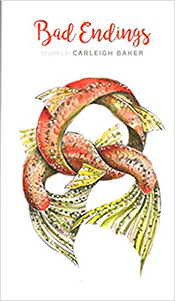Reviews
Fiction Review by Susan Sanford Blades
Carleigh Baker, Bad Endings (Vancouver: Anvil, 2017). Paperbound, 168 pp., $18.
 Carleigh Baker’s debut collection of short stories, Bad Endings, is a deft and humorous portrayal of 21st-century humans’ lack of connection with nature, our authentic selves, and each other. She paints a grim portrait, but in each story there is a glimmer of hope—a subtle connection (“we share a laugh like a cigarette”), a moment of insight (“But that instinct was wrong, not an instinct at all, really. Maybe the opposite of an instinct. A powerful and lifelong misconception that I am not a part of nature.”)—that leaves the reader feeling that if we’re going down, at least we’re going down together.
Carleigh Baker’s debut collection of short stories, Bad Endings, is a deft and humorous portrayal of 21st-century humans’ lack of connection with nature, our authentic selves, and each other. She paints a grim portrait, but in each story there is a glimmer of hope—a subtle connection (“we share a laugh like a cigarette”), a moment of insight (“But that instinct was wrong, not an instinct at all, really. Maybe the opposite of an instinct. A powerful and lifelong misconception that I am not a part of nature.”)—that leaves the reader feeling that if we’re going down, at least we’re going down together.
In “The Modern Intimate,” Baker captures the lack of humanity involved in online dating, how we have become a series of profile pics to swipe at, always searching for the next best thing to fill the void inside of us. “Nothing soothes the burn of a preemptive dump like a smoke, and a preemptive search for somebody new.” She goes on to take on married (and post-married) life in “Shoe Shopping with the Cash Poor.” Within the story, in three breath-taking sentences, Baker sums up suburban marriage: “When I was younger I used to look at the green light coming up from between the [escalator] cracks and worry about getting sucked under. Mall basements filled with the mangled bones of women. Women who died alone while their husbands circled the car outside.” In “Chins and Elbows,” Baker brilliantly touches on our attempts to bridge the divides between us. The divide of time (“The first hug in a long time is always all chins and elbows”) and the complex, topical subject of the divide between white Canadians’ vocal, academic, theoretical political correctness versus their reactions when face to face with a First Nations “violent offender” who “whoop[s] like an Indian in a John Wayne western” and jokes about her girlfriends going “to the pig farm.” In “Moosehide,” she further tackles the subject of modern First Nations identity via a Cree-Métis couple (who were “raised white”) on a canoe trip in the Arctic Circle. This story, my favourite of the collection, explores the couple’s quarter-life crisis through their struggle to identify their relationship with nature (“A handjob under the majestic Northern sky just seemed sad, and besides, we’d forgotten to bring the wet wipes”), technology (“If you’re in the Arctic, and you can’t Instagram it, does anybody care?”), each other (“People say travelling together is a true test of a relationship. Those people are correct.”), and their Indigenous ancestry. When the group they’re travelling with comes across a moose hide, the protagonist’s boyfriend wants to keep it, and suggests they could make a drum from it. “I turn around so he doesn’t see how hard I’m rolling my eyes. A drum. We’re accountants.” In the end, the protagonist alludes to the back-of-the-bus moment of temporary exaltation in the ending of The Graduate while contemplating being airlifted out before they finish the trip. It is a perfect encapsulation of the quarter-life crisis. Do they stay on this miserable, yet supposedly affirming trip or do they quit? There are so many decisions to make and no one to tell us which is correct. Is there a way to define the right path for yourself or do people simply start in a direction and become stuck in adulthood? “I’d imagined calm, and a clearing out of my mind that might make the future easier to see. Anyway. We’re doing it now. We’re committed.”
In reading Bad Endings,I had many moments of connection, of being led into the depths of my troubles, and having Baker provide me with a sentence or two that made me and my struggle feel seen. If I have any complaints about the book, it is that at times, the author slips from first-person narration into the second-person directive for no apparent reason, which I found jarring. In some stories, characters are unique, fully formed individuals; in others, they remained static and unknown to me.
Nevertheless, this is a satisfying read by an author whose talent is obvious in the way she succinctly sets a scene (“The morning mist is sea salt and oil slick”), in her understated humour (“Keep in mind, it’s thirty-five degrees, and I’ve had food poisoning for the last forty-eight hours. Keep it in mind, but try not to picture it”) and, as mentioned, in her pithy way of capturing our 21st-century struggles (re: video game addiction, “Good versus evil is such a comfort sometimes.”). Baker finishes Bad Endings with one question: “What now?” After reading this book, one is left with many questions and the knowledge that peace of mind lies not in the answers, but in the act of questioning itself.
—Susan Sanford Blades









